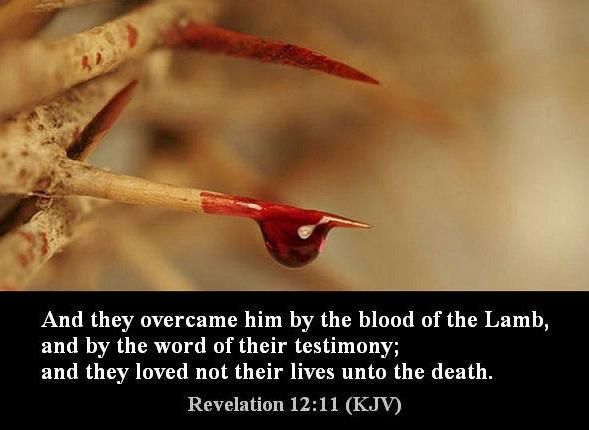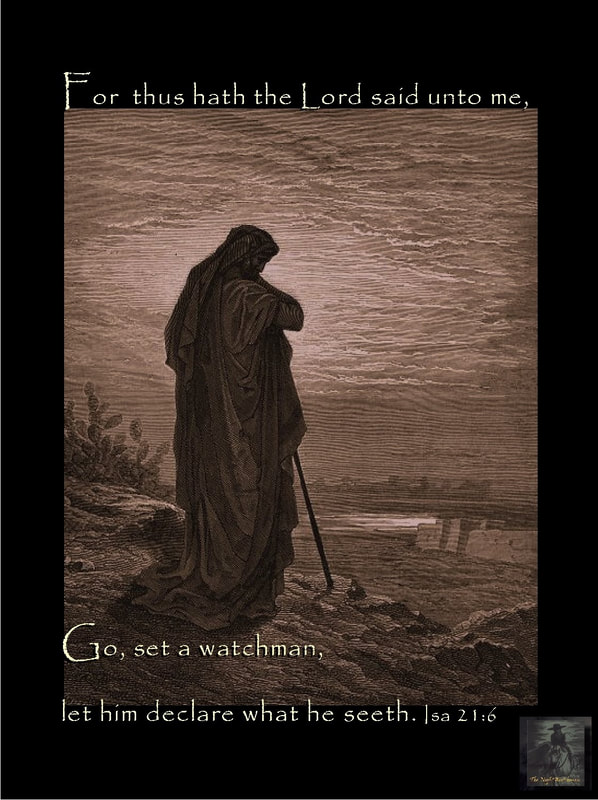|
And Gideon said unto God, Let not thine anger be hot against me, and I will speak but this once: let me prove, I pray thee, but this once with the fleece; let it now be dry only upon the fleece, and upon all the ground let there be dew. And God did so that night: for it was dry upon the fleece only, and there was dew on all the ground. Jdg 6:39-40 There are degrees to faith. At one stage of Christian experience we cannot believe unless we have some sign or some great manifestation of feeling. We feel our fleece, like Gideon, and if it is wet we are willing to trust God. This may be true faith, but it is imperfect. It always looks for feeling or some token besides the Word of God. It marks quite an advance in faith when we trust God without feelings. It is blessed to believe without having any emotion. There is a third stage of faith which even transcends that of Gideon and his fleece. The first phase of faith believes when there are favorable emotions, the second believes when there is the absence of feeling, but this third form of faith believes God and His Word when circumstances, emotions, appearances, people, and human reason all urge to the contrary. Paul exercised this faith in Act_27:20; Act_27:25, "And when neither sun nor stars in many days appeared, and no small tempest lay on us, all hope that we should be saved was then taken away." Notwithstanding all this Paul said, "Wherefore, sirs, be of good cheer; for I believe God, that it shall be even as it was told me." May God give us faith to fully trust His Word though everything else witness the other way. -- [C. H. P. Streams in the Desert] When is the time to trust? Is it when all is calm, When waves the victor’s palm, And life is one glad psalm Of joy and praise? Nay! but the time to trust Is when the waves beat high, When storm clouds fill the sky, And prayer is one long cry, O help and save! When is the time to trust? Is it when friends are true? Is it when comforts woo, And in all we say and do We meet but praise? Nay! but the time to trust Is when we stand alone, And summer birds have flown, And every prop is gone, All else but God. What is the time to trust? Is it some future day, When you have tried your way, And learned to trust and pray By bitter woe? Nay! but the time to trust Is in this moment’s need, Poor, broken, bruised reed! Poor, troubled soul, make speed To trust thy God. What is the time to trust? Is it when hopes beat high, When sunshine gilds the sky, And joy and ecstasy Fill all the heart? Nay! but the time to trust Is when our joy is fled, When sorrow bows the head, And all is cold and dead, All else but God. Anonymous The Miracle of the Dew and the Fleece Gideon owned the sovereignty and the power of God. So must we. In the matter of salvation we deal with Omnipotence. The God of grace is the Sovereign Ruler of the universe, Gideon believed in the omnipotence of God. He rested upon His promises. But he wanted a confirmation of his faith in these promises. He seemed to cast his eyes to heaven, and say in language which has often found response in the hearts of tried believers, “Shew me a token for good; that they which hate me may see it, and be ashamed; because Thou, Lord, hast held me, and comforted me.” Or, like one struggling to master his doubts and fears, on finding that he could not overcome the natural infidelity of his depraved heart, he turned to the stronghold whence alone help could come, and prayed, “Lord, I believe, help Thou mine unbelief.” The Lord did help his unbelief, by granting him the twofold miracle for which he prayed. It was a fine instance of childlike confidence in this “mighty man of valor” that as soon as his faith began to waver he at once told the Lord. Half of our difficulties in the Christian course would be got over, and got over quickly too, if we would but un-bosom our souls to the Lord, and tell Him our difficulties as soon as they arise. Now, the token vouchsafed to Gideon was peculiar in its nature. He was led, doubtless acting under the influence of the Holy Spirit, to ask of God a sign, and to choose a sign himself. In infinite condescension, God was pleased to accede to his petition. He suspended the ordinary laws of nature, and whether the fleece of wool was to be wet or dry, according to the prayer of this man of God, we are told, “God did so that night.” The grand doctrine to be deduced from this narrative is, that in confirmation of His promises, and in appearing on behalf of His people, the Lord suspended the ordinary laws of nature.
I. Observe, first, that it was none other than the Lord Jesus Christ Himself who thus answered Gideon’s prayer. God, to whom Gideon prayed in Jdg_6:36, is the same who “looked upon him,” and spoke to him in verse14. He was the angel of the covenant, who said, “Go in this thy might, and thou shalt save Israel from the hand of the Midianites: have not I sent thee?” Gideon prayed to this same Lord, that He would grant him a sign that He would save Israel by his hand, “As He had said.” The answer to Gideon’s prayer—the twofold miracle which was wrought—proved the proper Deity of Christ. It proved that the government of all things was indeed upon His shoulder. II. now, it is over the laws of nature that Christ reigns, for the good of His Church in all ages. We know not how little, nor how much, other worlds are affected by the redemption of Christ’s people in this world. It may be that inhabitants of other spheres and of other systems are learning the wisdom and the goodness and the love of God in the book of man’s salvation. Angels study it, the highest orders of intelligence make it their theme of praise, and why not beings in untold worlds which fill up the immensity of space? But be this as it may, all the laws of the universe are under the rule of the Lord Jesus for the good of His people. There is no law but the will of God. To deify law is to un-deify God. So to enthrone nature as to make her reign is to dethrone Jehovah, who alone does reign “God over all, blessed for evermore.” Time would fail us to dwell upon the many instances of the suspension of the laws of nature recorded in the Word of God. We will adduce but a few remarkable examples. 1. Observe the suspension of the laws of physical nature for the good of the people of God. Although heaven and earth should seem to oppose the fulfilment of His Word, although physical impossibilities may raise up a barrier the top of which no eye of sense can scale, yet the eye of faith soars above all nature, up to nature’s God, and rests calmly and peaceably upon His enthroned promise (Isa_43:2). 2. We might go on and educe instances of the like suspension of the laws of animal nature, in carrying out the purposes of Jehovah on behalf of His people. Birds of the air, the fish of the sea, and the beasts of the earth, have all obeyed other influences than the laws of their nature, in doing the will of their Creator. The instinct which they possess, is just that law which God sustains in them. Unclean and carnivorous birds forget their own natures, and spread their wings, and, as angels of mercy, visit the prophet in the wilderness, and daily spread his table. The fish devours not Jonah, but, at the word of the Lord, safely lands him on dry ground. The lions, too, become the harmless and the friendly companions of Daniel, and not a hair of his head is injured in their den. 1. Gideon’s need of a confirmation of his faith. The only question with this mighty man of valor was, “Is the Lord indeed with me? Is He on my side? Can I possibly have made any mistake? I do not doubt the Lord’s power. If He will, He can save Israel by my hand. But am I certain that I have not put too favorable an interpretation upon His promises? I will ask a sign of the Lord.” He did so, and you know with what result. Are you as anxious as was Gideon to learn the Lord’s will, and to insure His blessing in your undertakings? Do you make your daily callings a matter of prayer? Do you pause in your worldly business, and inquire with deep anxiety, “Is the Lord with me?” 2. You see the nature of that proof which the Lord gave to Gideon that His promises were sure: the dew was given and withheld according to the sign proposed. We may regard the dew as a striking and beautiful emblem of the Holy Spirit. (G. A. Rogers, M. A.) For whatsoever is born of God overcometh the world: and this is the victory that overcometh the world, even our faith. Who is he that overcometh the world, but he that believeth that Jesus is the Son of God? IJn 5:4-5 THE VICTORIOUS LIFE
Let your faith entwine around the risen Lord and you will be weaned from all else. Jesus must become all-in-all to you, else you will miss the crown! We need not only the water of repentance, but also the blood of propitiation. When these two are admitted, the Holy Spirit will bear His secret witness to the soul. God is ever bearing witness to the Son by the eternal life that He gives to and maintains in those who believe. Eternity begins even here for those who have the Son as their indwelling guest. [F.B. Meyer] Faith-Beyond What the Eye's Can See To trust in spite of the look of being forsaken; to keep crying out into the vast, whence comes no returning voice, and where seems no hearing; to see the machinery of the world pauselessly grinding on as if self-moved, caring for no life, nor shifting a hair-breadth for all entreaty, and yet believe that God is awake and utterly loving; to desire nothing but what comes meant for us from His hand; to wait patiently, ready to die of hunger, fearing only lest faith should fail-- such is the victory that overcometh the world, such is faith indeed. -- George MacDonald It is easy to love Him when the blue is in the sky, When summer winds are blowing, and we smell the roses nigh; There is little effort needed to obey His precious will When it leads through flower-decked valley, or over sun-kissed hill. It is when the rain is falling, or the mist hangs in the air, When the road is dark and rugged, and the wind no longer fair, When the rosy dawn has settled in a shadowland of gray, That we find it hard to trust Him, and are slower to obey. It is easy to trust Him when the singing birds have come, And their canticles are echoed in our heart and in our home; But ’tis when we miss the music, and the days are dull and drear, That we need a faith triumphant over every doubt and fear. And our blessed Lord will give it; what we lack He will supply; Let us ask in faith believing-- on His promises rely; He will ever be our Leader, whether smooth or rough the way, And will prove Himself sufficient for the needs of every day. George MacDonald [Streams in the Desert] The Power that Overcomes the World It is usual to limit thought to faith as the power that ensures our victory over our surroundings, our “overcoming the world”; but if this paragraph be taken as connected thinking, it will be seen that John explains what faith it is that thus overcomes the world. It is the faith in the Sonship of Jesus, which links us to Him, makes us sons like Him, and brings to us the victory of obedience and submission which He won. (It will be understood that 1Jn_5:7, in this paragraph, is treated as an interpolation, inserted by some later hand to support a particular theory.)
I. The faith that overcomes.—It is significant that St. John should say, “even our faith.” It may be true—it is in fact true—that faith, as one of the powers of human nature, the power that enables a man to act upon unseen considerations, does enable men to rise above the entanglement and depression of present circumstances. The world could not get on without faith. All her high triumphs have been triumphs of faith. But John’s world is not the world of material difficulties, but the world of moral evils. And he knows well enough that commonplace human faith can never gain victory over that. It is our faith—that specific thing which must be called the “Christian faith,” which alone can overcome the moral world, the world of evil. II. The object of the faith that overcomes.—“Who is he that overcometh the world, but he that believeth that Jesus is the Son of God?” “Whatsoever is born of God overcometh the world.” It should not be possible for us to miss the point of John’s teaching in these sentences. It is the man who, believing in Jesus as the Son of God, is himself a son of God who overcomes the world. The object of faith is the Sonship, or, more precisely, Christ the Son. His Sonship was the secret of His triumph over the world, which, though He lived in, He was not of. And our sonship in Him will have to be the secret of our triumph, if ever it be said of us, they have overcome the world. III. The grounds faith has for resting on this object.—Jesus the Son is fully attested; the witnesses are altogether sufficient and trustworthy. There are three witnesses to the acceptable Sonship. The Spirit, who testifies of Christ in our hearts. (But it is quite possible that John had in his mind the spirit of the life of Jesus, which was the most perfect expression of sonship, and the satisfactory attestation that He was the Son.) The water, which stands for the direct testimony given by the Father at our Lord’s baptism: “This is My beloved Son, in whom I am well pleased.” And the blood, which stands for the Divine acceptance of our Lord’s sacrifice—the self-sacrifice of the Son—which was declared in His resurrection from the dead. “These three agree in one” thing; they declare that “Jesus is the Son of God,” and present Him to us, in this relation, as the object of our faith. The Worldly Idea of overcoming the World.—We read in history of one in departed days who fancied that he had accomplished the hard task of “overcoming the world.” We read how he carried his victorious arms over every region of the then known earth—how he subjugated king after king, and brought nation after nation beneath his sway, and then fancied that he had “overcome the world.” We read how he felt it sad to think that his heroic task was done, and how he wept that there were no more worlds to conquer. Oh, far astray, far mistaken! There was one world to conquer yet, to which that conqueror was a slave—a world to overcome for which the arms of Alexander were of no avail. “This is the victory that overcometh the world, even our faith.”— [A. K. H. B. Preacher's Homiletical] Rev 3:12 Him that overcometh will I make a pillar in the temple of my God, and he shall go no more out: and I will write upon him the name of my God, and the name of the city of my God, which is new Jerusalem, which cometh down out of heaven from my God: and I will write upon him my new name. Rev 3:21 To him that overcometh will I grant to sit with me in my throne, even as I also overcame, and am set down with my Father in his throne. Rev 12:11 And they overcame him by the blood of the Lamb, and by the word of their testimony; and they loved not their lives unto the death. And there we saw the giants, the sons of Anak, which come of the giants: and we were in our own sight as grasshoppers, and so we were in their sight. Num 13:33 Follow God-Wherever He Leads Yes, they saw the giants, but Caleb and Joshua saw God! Those who doubt say, "We be not able to go up." Those who believe say, "Let us go up at once and possess it, for we are well able." Giants stand for great difficulties; and giants are stalking everywhere. They are in our families, in our churches, in our social life, in our own hearts; and we must overcome them or they will eat us up, as these men of old said of the giants of Canaan. The men of faith said, "They are bread for us; we will eat them up." In other words, "We will be stronger by overcoming them than if there had been no giants to overcome." Now the fact is, unless we have the overcoming faith we shall be eaten up, consumed by the giants in our path. Let us have the spirit of faith that these men of faith had, and see God, and He will take care of the difficulties. -- Selected It is when we are in the way of duty that we find giants. It was when Israel was going forward that the giants appeared. When they turned back into the wilderness they found none. There is a prevalent idea that the power of God in a human life should lift us above all trials and conflicts. The fact is, the power of God always brings a conflict and a struggle. One would have thought that on his great missionary journey to Rome, Paul would have been carried by some mighty providence above the power of storms and tempests and enemies. But, on the contrary, it was one long, hard fight with persecuting Jews, with wild tempests, with venomous vipers and all the powers of earth and hell, and at last he was saved, as it seemed, by the narrowest margin, and had to swim ashore at Malta on a piece of wreckage and barely escape a watery grave. Was that like a God of infinite power? Yes, just like Him. And so Paul tells us that when he took the Lord Jesus Christ as the life of his body, a severe conflict immediately came; indeed, a conflict that never ended, a pressure that was persistent, but out of which he always emerged victorious through the strength of Jesus Christ. The language in which he describes this is most graphic. "We are troubled on every side, yet not distressed; perplexed, but not in despair; persecuted, but not forsaken; cast down, but not destroyed, always bearing about in the body the dying of the Lord Jesus, that the life also of Jesus might be manifested in our body." What a ceaseless, strenuous struggle! It is impossible to express in English the forcible language of the original. There are five pictures in succession. In the first, the idea is crowding enemies pressing in from every side, and yet not crushing him because the police of heaven cleared the way just wide enough for him to get through. The literal translation would be, "We are crowded on every side, but not crushed." The second picture is that of one whose way seems utterly closed and yet he has pressed through; there is light enough to show him the next step. The Revised Version translates it, "Perplexed but not unto despair." Rotherham still more literally renders it, "Without a way, but not without a by-way." The third figure is that of an enemy in hot pursuit while the divine Defender still stands by, and he is not left alone. Again we adopt the fine rendering of Rotherham, "Pursued but not abandoned." The fourth figure is still more vivid and dramatic. The enemy has overtaken him, has struck him, has knocked him down. But it is not a fatal blow; he is able to rise again. It might be translated, "Overthrown but not overcome." Once more the figure advances, and now it seems to be even death itself, "Always bearing about in the body the dying of the Lord Jesus." But he does not die, for "the life also of Jesus" now comes to his aid and he lives in the life of another until his life work is done. The reason so many fail in this experience of divine healing is because they expect to have it all without a struggle, and when the conflict comes and the battle wages long, they become discouraged and surrender. God has nothing worth having that is easy. There are no cheap goods in the heavenly market. Our redemption cost all that God had to give, and everything worth having is expensive. Hard places are the very school of faith and character, and if we are to rise over mere human strength and prove the power of life divine in these mortal bodies, it must be through a process of conflict that may well be called the birth travail of a new life. It is the old figure of the bush that burned, but was not consumed, or of the Vision in the house of the Interpreter of the flame that would not expire, notwithstanding the fact that the demon ceaselessly poured water on it, because in the background stood an angel ever pouring oil and keeping the flame aglow. No, dear suffering child of God, you cannot fail if only you dare to believe, to stand fast and refuse to be overcome. -- Tract. (Streams in the Desert) THE MAJORITY AND MINORITY REPORTS It was August. Eshcol lay southeast of Hebron. Its sloping hills were covered with choice grapevines, the clusters of which weighed ten to twelve pounds. The tall, muscular Canaanites presented a strong contrast to the more diminutive Egyptians. The spies compared the Canaanites with themselves, instead of with Almighty God. Do not look at God through circumstances, but at circumstances through God. There is no land worth possessing which has not its giants; but, like Caleb, faith looks not at giants, but to the living God. See Num_14:8. The doubters said Can God? Caleb affirmed, God can! Only follow God fully! Be utterly yielded to Him. Present yourself to God as alive from the dead, and eternally united to the living Christ; then He will bruise Satan under your feet and make you tread upon the lion and adder, Psa_91:13; Rom_16:20. (F.B. Meyer)
Psa 91:13 Thou shalt tread upon the lion and adder: the young lion and the dragon shalt thou trample under feet. Rom 16:20 And the God of peace shall bruise Satan under your feet shortly. The grace of our Lord Jesus Christ be with you. Amen. And thine ears shall hear a word behind thee, saying, This is the way, walk ye in it, when ye turn to the right hand, and when ye turn to the left. Isa 30:21 The Guiding Word Man is a traveler. He has lost his way. He needs a guide, both to bring him back to, and keep him in, the right path to the end of the journey. Where is that guide to be found? It is referred to in the text. “A word behind thee.” The following remarks are suggested concerning this guiding word. I. It comes to man from WITHOUT. There are inner guides placed there by our Maker in our constitution. Reason. Conscience. But both these have failed us. They themselves are lost in the haze of depravity. Hence the need of a guide from without; such a guide as “the word.” It comes from God to man-- 1. Through nature. 2. Through Christ. II. It comes to man in EXPLICITNESS. “This is the way, walk ye in it, when ye turn to the right hand, and when ye turn to the left.” There is no indefiniteness here, no vagueness, and no uncertainty; no suggesting a choice between different ways. The word reveals the right and only way, and that way is Christ. “I am the way”—“Follow Me.” III. It comes to man from MYSTERY. “Behind thee.” Thou dost not see the speaker. The voice breaks out from the dark past. It comes from “behind.” Behind all that is seen and heard, behind all the phenomena of nature, behind the universe, from God Himself, the Mysterious One. IV. It comes to man, BUT HE MUST LISTEN. “Thou shalt hear.” This hearing is the want. Men’s spiritual ears are deaf. The guiding word is everywhere. “There is no speech nor language where His voice is not heard.” Open thine ear: listen and thou shalt catch the guiding directions. (Homilist) The Path Through the Wilderness When we are in doubt or difficulty, when many voices urge this course or the other, when prudence utters one advice and faith another, then let us be still, hushing each intruder, calming ourselves in the sacred hush of God’s presence; let us study His Word in the attitude of devout attention; let us lift up our nature into the pure light of His face, eager only to know what God the Lord shall determine-- and ere long a very distinct impression will be made, the unmistakable forth-telling of His secret counsel. It is not wise in the earlier stages of Christian life to depend on this alone, but to wait for the corroboration of circumstances. But those who have had many dealings with God know well the value of secret fellowship with Him, to ascertain His will. Are you in difficulty about your way? Go to God with your question; get direction from the light of His smile or the cloud of His refusal. If you will only get alone, where the lights and shadows of earth cannot interfere, where human opinions fail to reach and if you will dare to wait there silent and expectant, though all around you insist on immediate decision or action-- the will of God will be made clear; and you will have a new conception of God, a deeper insight into His nature and heart of love, which shall be for yourself alone a rapturous experience, to abide your precious perquisite forever, the rich guerdon of those long waiting hours. -- (King David) [Streams in the Desert] "STAND STILL," my soul, for so thy Lord commands:
E’en when thy way seems blocked, leave it in His wise hands; His arm is mighty to divide the wave. "Stand still," my soul, "stand still" and thou shalt see How God can work the "impossible" for thee, For with a great deliverance He doth save. Be not impatient, but in stillness stand, Even when compassed ’’round on every hand, In ways thy spirit does not comprehend. God cannot clear thy way till thou art still, That He may work in thee His blessed will, And all thy heart and will to Him do bend. "BE STILL," my soul, for just as thou art still, Can God reveal Himself to thee; until Through thee His love and light and life can freely flow; In stillness God can work through thee and reach The souls around thee. He then through thee can teach His lessons, and His power in weakness show. "BE STILL"-- a deeper step in faith and rest. "Be still and know" thy Father knoweth best The way to lead His child to that fair land, A "summer" land, where quiet waters flow; Where longing souls are satisfied, and "know Their God," and praise for all that He has planned. [Anonymous] I am the vine, ye are the branches: He that abideth in me, and I in him, the same bringeth forth much fruit: for without me ye can do nothing. Joh 15:5 How many times have I had to learn this; more times than I can count. When I look behind me, how much of what I've attempted to achieve, really meant anything, when placed under your scrutiny Lord. The sadness in my heart, reveals the honest answer I have to acknowledge, and accept. So much of what I thought was important, has proven to be chaff in the wind. Meaningless, a blip in eternity-and gone. You are the source of all truth, of all purpose, and all that holds my past, and my future. Every test, and every trial has served to expose the real motives for every attempt for success, or something that seemed important at the time. What was the end result- did it serve any real purpose? Was anyone helped, or encouraged to overcome in their trials or problems they faced? Did anyone hear of You, the Savior of the world, of Your greatness? How much of what I've done dissolved into dust, and only served to satisfy a lust, born of selfishness. With each of these questions reaching my heart, the reality sinks in, how much of my life has been wasted on things that mean nothing; when measured in these terms. When I examine any achievements using Your word, the light of Your truth exposes it for what it really is, whether good fruit or chaff to be burned. The only thing that I can bring to Your feet, is my love, and the consuming desire to know You, and be found in You, in spite of every failure, in spite of this body of clay. Without the power of the Holy Spirit-I realize I would never do anything but wrong. Anything I may ever have done to bring You any glory, has been because of the Presence of the Holy Spirit within me. It's only Him who has brought this body under obedience, and ever given You the glory You deserve. Many times I've felt the same as David, wanting to give You honor, glory, and worship, but weary from the battles of life, and assaults of the devil, coming from many directions. He is the master of cunning deceit, trickery, and knows every way to provoke to the point of dragging us into the dirt, and falling into sin. How many times, have I found myself on my face, in the dirt. But, even there, I will praise you Lord, because with my face in the dirt, I'm forced to realize without You-this is where I will always end up, and, after all, I am but speaking dust. Yes, even when the devil has brought me low, even to the ground-he hasn't succeeded in killing my love for You. It only grows hotter. When I'm at the lowest, I don't know why-but even there, I find you there also. I can't help but smile, and my heart leaps within me, because even in the depths, the devil can't keep you out. I sense your Presence, again, as David speaks of in his psalm: Psa 139:8 If I ascend up into heaven, thou art there: if I make my bed in hell, behold, thou art there. Psa 139:9 If I take the wings of the morning, and dwell in the uttermost parts of the sea; Psa 139:10 Even there shall thy hand lead me, and thy right hand shall hold me. When I consider these verses, and the truth of them, it's impossible to not praise You. You were in the fires of Nebuchadnezzar's furnace with the three Hebrew young boys-and You've shown me, You are in the midst of my trials and the assaults of the devil. He is already a defeated foe, but won't concede to it yet. But, his time is short. As David did when he was convicted of sin, I cling to You even more; and cry out as he did, confessing my sin before You, and asking for Your mercy, forgiveness, and to cleanse me from all unrighteousness. Then, help me to stand again, and go on, with You before me, guiding the path for my feet, until the day You decide to take me home, and we meet face to face, held in Your embrace. Psa 51:1 Have mercy upon me, O God, according to thy lovingkindness: according unto the multitude of thy tender mercies blot out my transgressions. Psa 51:2 Wash me throughly from mine iniquity, and cleanse me from my sin. Psa 51:3 For I acknowledge my transgressions: and my sin is ever before me. Psa 51:4 Against thee, thee only, have I sinned, and done this evil in thy sight: that thou mightest be justified when thou speakest, and be clear when thou judgest. Psa 51:11 Cast me not away from thy presence; and take not thy holy spirit from me. Psa 51:12 Restore unto me the joy of thy salvation; and uphold me with thy free spirit. Psa 51:13 Then will I teach transgressors thy ways; and sinners shall be converted unto thee. Psa 51:14 Deliver me from bloodguiltiness, O God, thou God of my salvation: and my tongue shall sing aloud of thy righteousness. Psa 51:15 O Lord, open thou my lips; and my mouth shall shew forth thy praise. “Without Me Ye Can Do Nothing.”
Without Me Ye Can Do Nothing Separated from me, ye can do nothing at all. God can do without man, but man cannot do without God. Following the metaphor of our Lord, it would be just as possible to do any good without him, as for a branch to live, thrive, and bring forth fruit, while cut off from that tree from which it not only derives its juices, but its very existence also.
Nearly similar to this saying of our Lord, is that of Creeshna (the incarnate God of the Hindoos) to his disciple Arjoon: “God is the gift of charity; God is the offering: God is the fire of the altar; by God the sacrifice is performed; and God is to be obtained by him who maketh God alone the object of his works.” And again: “I am the sacrifice; I am the worship; I am the spices; I am the invocation; I am the fire; and I am the victim. I am the Father of this world, and the Preserver. I am the Holy One, worthy to be known; the mystic figure Om; (see on Joh_1:14 (note)) I am the journey of the good; the Comforter; the Creator; the Witness; the resting-place; the asylum, and the Friend. I am the place of all things; and the inexhaustible seed of nature; I am sunshine, and I am rain; I now draw in, and now let forth.” See Bhagvat Geeta, pp. 54 and 80. Could such sentiments as these ever come from any other source than Divine revelation? There is a saying in Theophilus very similar to one of those above: God is not comprehended, but he is the place of all things. [Adam Clarke] Corresponding scripture: 1Jn 1:5 This then is the message which we have heard of him, and declare unto you, that God is light, and in him is no darkness at all. 1Jn 1:6 If we say that we have fellowship with him, and walk in darkness, we lie, and do not the truth: 1Jn 1:7 But if we walk in the light, as he is in the light, we have fellowship one with another, and the blood of Jesus Christ his Son cleanseth us from all sin. 1Jn 1:8 If we say that we have no sin, we deceive ourselves, and the truth is not in us. 1Jn 1:9 If we confess our sins, he is faithful and just to forgive us our sins, and to cleanse us from all unrighteousness. 1Jn 1:10 If we say that we have not sinned, we make him a liar, and his word is not in us. For thou, LORD, art high above all the earth: thou art exalted far above all gods. Ye that love the LORD, hate evil: he preserveth the souls of his saints; he delivereth them out of the hand of the wicked. Psa 97:9-10 Treasury of David Charles Haddon Spurgeon “For thou, Lord, art high above all the earth.” "And therefore do we rejoice to see the idols abolished and to see all mankind bending at thy throne. There is but one God, there cannot be another, and he is and ever must be over all. “Thou art exalted far above all gods.” As much as ALL is exalted above nothing, and perfection above folly. Jehovah is not alone high over Judea, but over all the earth, nor is he exalted over men only, but over everything that can be called god: the days are on their way when all men shall discern this truth, and shall render unto the Lord the glory which is due alone to him." Charles Haddon Spurgeon-Morning Devotion "Thou hast good reason to "hate evil," for only consider what harm it has already wrought thee. Oh, what a world of mischief sin has brought into thy heart! Sin blinded thee so that thou couldst not see the beauty of the Saviour; it made thee deaf so that thou couldst not hear the Redeemer's tender invitations. Sin turned thy feet into the way of death, and poured poison into the very fountain of thy being; it tainted thy heart, and made it "deceitful above all things, and desperately wicked." Oh, what a creature thou wast when evil had done its utmost with thee, before divine grace interposed! Thou wast an heir of wrath even as others; thou didst "run with the multitude to do evil." Such were all of us; but Paul reminds us, "but ye are washed, but ye are sanctified, but ye are justified in the name of the Lord Jesus, and by the Spirit of our God." We have good reason, indeed, for hating evil when we look back and trace its deadly workings. Such mischief did evil do us, that our souls would have been lost had not omnipotent love interfered to redeem us. Even now it is an active enemy, ever watching to do us hurt, and to drag us to perdition. Therefore "hate evil," O Christians, unless you desire trouble. If you would strew your path with thorns, and plant nettles in your death-pillow, then neglect to "hate evil:" but if you would live a happy life, and die a peaceful death, then walk in all the ways of holiness, hating evil, even unto the end. If you truly love your Saviour, and would honour him, then "hate evil." We know of no cure for the love of evil in a Christian like abundant intercourse with the Lord Jesus. Dwell much with him, and it is impossible for you to be at peace with sin." "Order my footsteps by thy Word, And make my heart sincere; Let sin have no dominion, Lord, But keep my conscience clear." Treasury of David Charles Haddon Spurgeon “Ye that love the Lord, hate evil.” "For he hates it, his fire consumes it, his lightnings blast it, his presence shakes it out of its place, and his glory confounds all the lovers of it. We cannot love God without hating that which he hates. We are not only to avoid evil, and to refuse to countenance it, but we must be in arms against it, and bear towards it a hearty indignation. “He preserveth the souls of his saints.” Therefore they need not be afraid of proclaiming war with the party which favours sin. The saints are the safe ones: they have been saved and shall be saved. God keeps those who keep his law. Those who love the Lord shall see his love manifested to them in their preservation from their enemies, and as they keep far from evil so shall evil be kept far from them. “He delivereth them out of the hand of the wicked.” It is not consistent with the glory of his name to give over to the power of his foes those whom his grace has made his friends. He may leave the bodies of his persecuted saints in the hand of the wicked, but not their souls, these are very dear to him, and he preserves them safe in his bosom. This foretells for the church a season of battling with the powers of darkness, but the Lord will preserve it and bring it forth to the light.
See also: Psa_34:14, Psa_36:4, Psa_37:27, Psa_101:3, Psa_119:104, Psa_119:163; Pro_3:7, Pro_8:13; Amo_5:15; Rom_7:15, Rom_7:24, Rom_12:9 |
Welcome
In this page there will be devotions/poems music and inspirational material 
The Lord Will Pour Out His Spirit
And it shall come to pass afterward, that I will pour out my spirit upon all flesh; and your sons and your daughters shall prophesy, your old men shall dream dreams, your young men shall see visions:
And also upon the servants and upon the handmaids in those days will I pour out my spirit. And I will shew wonders in the heavens and in the earth, blood, and fire, and pillars of smoke. The sun shall be turned into darkness, and the moon into blood, before the great and the terrible day of the LORD come. And it shall come to pass, that whosoever shall call on the name of the LORD shall be delivered: for in mount Zion and in Jerusalem shall be deliverance, as the LORD hath said, and in the remnant whom the LORD shall call. Joel 2:28-32 But this is that which was spoken by the
prophet Joel; And it shall come to pass in the last days, saith God, I will pour out of my Spirit upon all flesh: and your sons and your daughters shall prophesy, and your young men shall see visions, and your old men shall dream dreams: And on my servants and on my handmaidens I will pour out in those days of my Spirit; and they shall prophesy: Act 2:16-18 Resources
Madame Guyon - A Short and Easy Method of Prayer / Christian Audio Book (1 / 2) https://youtu.be/eihZWpAk7y4?si=PQ-_J3Y6i8u-N2Ac Union With God By Jeanne Guyon Chapter 1 Of 7 https://youtu.be/d5AfKS2dFLg?si=VtWAeEurkAddTDpL The Practice of the Presence of God - audiobook Brother LAWRENCE (1614 - 1691)- https://youtu.be/rRAs_BK1NR8?si=hGAL4C829aH7 DKMn Gander Story Poems
https://www.gander poems.org/ Archives
July 2024
|
Proudly powered by Weebly














